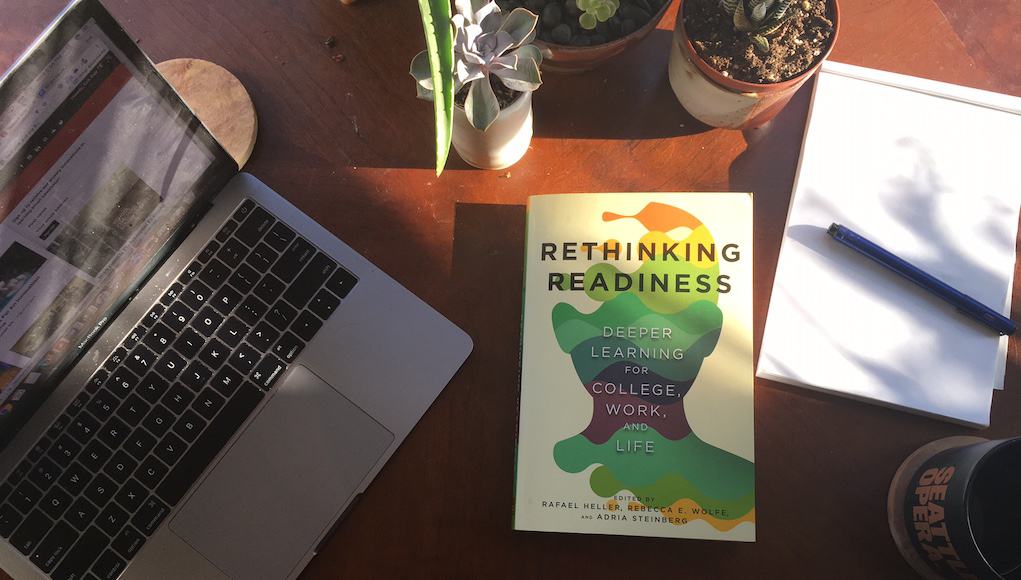Smart Review | Rethinking Readiness: Deeper Learning for College, Work, and Life

The times they are a changin’.
It’s an undeniably powerful sentiment, and one that can be felt throughout the recently released Rethinking Readiness: Deeper Learning for College, Work, and Life.
The latest from the William and Flora Hewlett Foundation, Rethinking Readiness is a compilation of ten whitepapers written by the Jobs For the Future team, featuring entries by writers such as Pedro Noguera and Linda Darling-Hammond, and edited by contributing authors Rafael Heller, Rebecca E. Wolfe and Adria Steinberg.
If you’ve ever googled a phrase like “college readiness” or “deeper learning” and found a hundred resources each giving you a different prescriptive way to adhere to the latest buzzword, prepare to not be disappointed by Rethinking Readiness.
Rather than advocate for a certain form of deeper learning (which they argue could in many cases be replaced with other popular but vague concepts such as social-emotional learning or 21st-century skills) for post-secondary readiness, this collection seeks to encourage “truly open-ended debate” on the following question: “If college, career, and civic readiness require more than just higher academic standards and tougher accountability–the focus of most education policy making over the last few decades–then what are the implications for schools, educators, and students?”
As such, the book offers an impressive range of research-based food for thought regarding student readiness without advocating for any one “best” answer to the issues facing education today.
The organizational structure takes the reader through a logical flow from “where we are and how we got here” to “equity in access and opportunity” to “school improvement,” and the authors touch on arguments for, among many other things, the need for a new approach to readiness that goes beyond the age-old debate of “skills vs. content” and the importance of mastery and public demonstrations of it. The final section includes a number of in-depth looks at examples of what teaching, leadership and assessment can look like in light of these findings.


Because of the book’s focus on non-prescriptiveness, it can provide a great foundation for exploring new ideas, and the impressive endnote citation list makes for an almost endless potential deeper dive. Unfortunately, this approach may occasionally leave the reader wanting more (the section on supporting ELL students, for example, provides some great research-based perspective on challenges and opportunities in the space of preparing ELL and immigrant students for post-secondary success, but still left me with a distinct feeling that I was leaving with more questions than I came with).
However, I agree with the authors that even if it doesn’t end with an entirely satisfying feeling, this is probably the best approach to the discussion of these sorts of issues. Addressing racial disparities and supporting immigrants are among the most important challenges facing education today, and they are challenges that will look very different in different settings. Here, more than in most areas of education, there will not be one “best” solution (though some readiness initiatives are generating data that supports progress for previously underserved students, like this one, in which over the course of six years the number of students with college-ready transcripts rose from 37% to 56%).
And anyway, questions are an important part of the growing process and failing forward.
If you’re looking to expand the horizons of your approach to post-secondary readiness with a research-based 30,000 feet approach to the “why” and “how,” then gather round, people–wherever you roam. Rethinking Readiness can serve as a fount of ideas.
For more on readiness, see:
- An Integrated Approach to Academic and Social Supports
- Getting Smart Podcast | Partnerships Propel Readiness Results with a Focus on Equity
- The Three Keys to College Persistence
Stay in-the-know with all things EdTech and innovations in learning by signing up to receive the weekly Smart Update. This post includes mentions of a Getting Smart partner. For a full list of partners, affiliate organizations and all other disclosures, please see our Partner page.






0 Comments
Leave a Comment
Your email address will not be published. All fields are required.